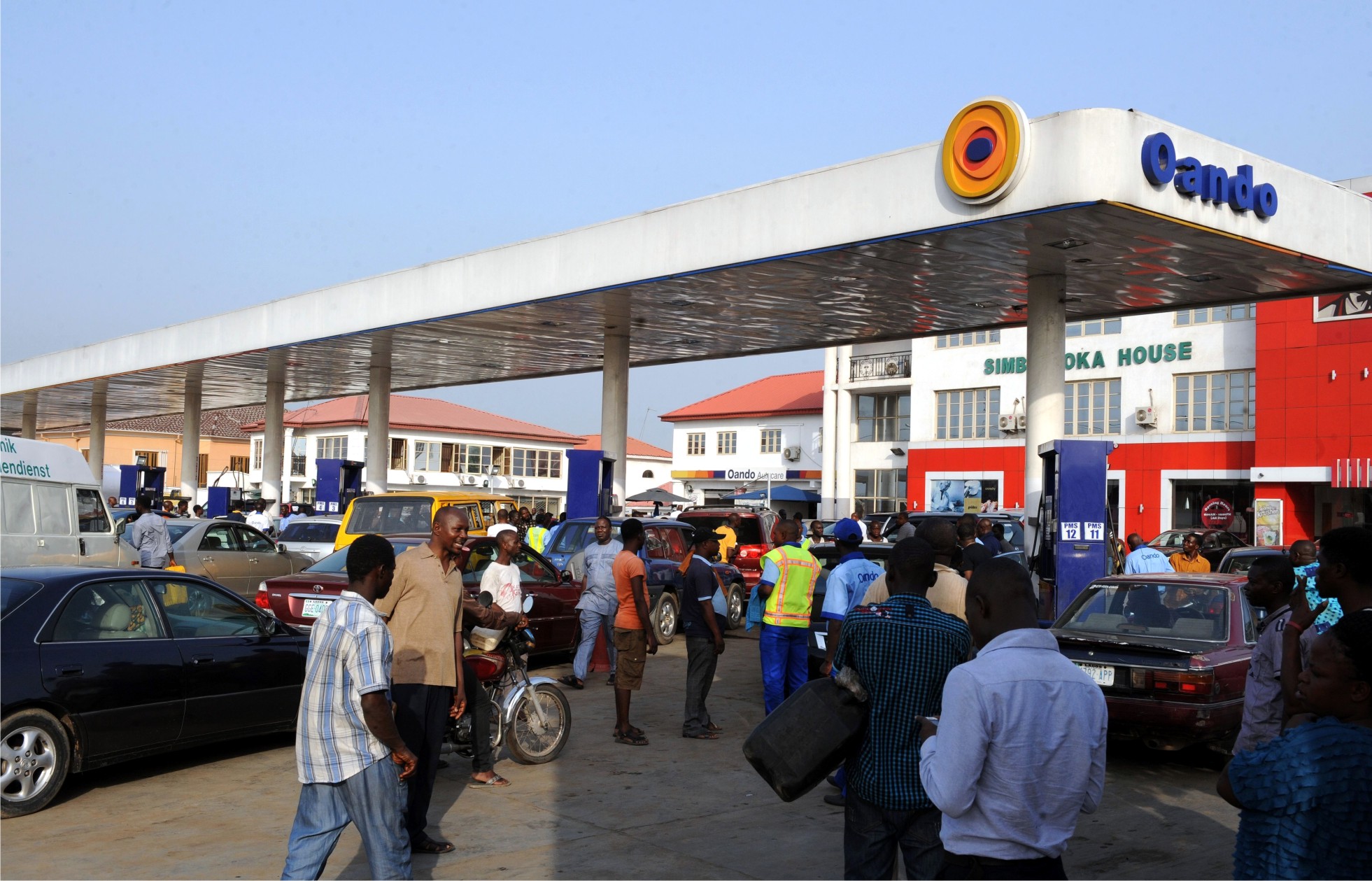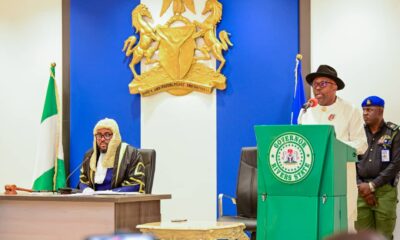Oil & Energy
Residents, Traders Protest Indiscriminate Location Of Gas Stations

Residents and traders in Akure took to the streets over the weekend to protest what they called indiscriminate location of gas stations in their neighbourhood.
The protesting residents and traders, mainly from Ireakari and Temidire quarters at the popular Roadblock area of Akure, alleged that petrol dealers attempted to erect two more gas stations near an existing one.
They said that the step could lead to fire incident capable of consuming the entire neighbourhood.
According to one of the protesters, Mr Abayomi Ajijola-Ajofe, a youth leader, the protest was triggered by a midnight inferno, which occurred behind the proposed site of a new gas station, 24 hours ago.
“We are protesting because we don’t want any more gas stations in our area, we have one already and that is okay.
“We fear fire incident that could consume our houses if another one is located here. We are concerned about our safety, the one we have already is okay.
“Therefore, we the youths will take unpleasant actions against the dealers of the proposed gas stations if they continue with the construction. We learnt that one government agency has given them licence or permission to operate, we will not take that. They should withdraw the licence now or else, we will make this area unpleasant for them,” Ajijola-Ajofe said.
The chairman of Temidire landlords, Mr Ibrahim Adeuyi, called on the Ondo State Government and the Department of Petroleum Resources (DPR) to withdraw the certificate of allocation of gas stations in the area.
Adeuyi, who noted that a plank market was located behind the proposed gas station, pointed out that locating gas stations in residential areas would be prone to fire incidents.
A trader, Mr Kazeem Jinadu, said residents would resist any attempt by the petrol dealers to induce officials of the DPR or that of the state government to approve such new gas stations at the roadblock axis of the town.
A plank trader among the protesters, Mrs Jumoke Akinsele, said that nobody would be safe again if new gas or filling stations were allowed to be located in the area.
“We, plank sellers here appealed to our baba (father), Governor Oluwarotimi Akeredolu, to stop the location of another gas station beside a filling station and a house that was on fire yesterday.
“Most of us are widows, this is where we get money to feed our children and send them to school, we don’t want fire to consume our markets,” she said.
Another plank seller, Mrs Eunice Akeju, who also spoke with journalists, said it was unacceptable to have three gas stations in such an area.
“We discovered recently that another gas station is about to be located around us here, we are protesting against this. We have a gas station, we also have petrol stations there, and that is why we are saying that we don’t want another one here because of our safety,” Akeju said.
The residents said they had written a petition to the state government and the DPR not to allow another gas station in the area.
Meanwhile, one of the victims of fire incident, Mrs Monisola Adewumi, pleaded with the state government to come to her aid as she took loan to set up her business.
Adewumi, who was crying profusely, appealed to well meaning individuals to assist her and other victims of the inferno.
An eyewitness also told newsmen that the fire which started in the night, gutted five rooms and shops with three big deep freezers, four big generators and other electronic appliances worth millions of naira.
The Tide recalls that last week, the Federal Government, through officials of the DPR, in conjunction with the Nigeria Security and Civil Defence Corps, NSCDC, started clamping down on illegal “roadside dealers” of cooking gas, originally known as Liquefied Petroleum Gas, to prevent fires.
Oil & Energy
Bill Prohibiting Gas Flaring Passes 2nd Reading

The Bill for an act to prohibit gas flaring, encourage commodity utilisation, and provide for penalties and remedies for gas flaring violations has passed its second reading in the House of Representatives.
Sponsored by the Member representing Ikorodu Federal Constituency (APC, Lagos), Babajimi Adegoke Benson, the bill seeks to prohibit the flaring and venting of natural gas, except in strictly regulated circumstances, while encouraging the utilisation of gas resources to foster economic growth and energy generation.
The proposed legislation aims to mitigate the environmental, health, and economic impacts of gas flaring, aligning Nigeria’s oil and gas operations with international climate change commitments.
Offenders, who violate the provisions of the proposed law, would face stringent penalties, including fines of $5 per 1,000 standard cubic feet of gas flared and potential suspension of operations for repeat violations.
Leading debate on the general principles of the bill, Benson said gas flaring has plagued Nigeria for decades, resulting to severe environmental degradation, public health crises, and economic losses while it environmentally, contributes to greenhouse gas emissions, global warming, and acid rain, exacerbating climate challenges.
The lawmaker said public health impacts of the practice are equally dire, as pollutants from gas flaring cause respiratory and cardiovascular diseases, particularly among residents of communities close to flaring sites.
According to him, economically, flaring results in the waste of a valuable resource that could otherwise be harnessed for energy generation or exported to generate revenue.
Benson insisted that the bill was designed to address those issues while bringing Nigeria in line with global standards such as the Paris Agreement on climate change.
“The bill provides for a comprehensive prohibition of gas flaring except in emergencies or when explicitly authorised by the Nigerian Upstream Petroleum Regulatory Commission (NUPRC).
“Operators are required to submit and implement Gas Utilisation Plans, detailing how gas that would otherwise be flared will be captured, processed, or commercialised.
“Offenders, who violate these provisions, face stringent penalties, including fines of $5 per 1,000 standard cubic feet of gas flared and potential suspension of operations for repeat violations. Furthermore, the Bill ensures that communities affected by gas flaring are entitled to compensation and environmental restoration, creating a mechanism for redress.
“Transparency and accountability are integral to the enforcement framework of this Bill. Operators must submit regular reports on gas flaring incidents, which will be audited and made publicly available by the NUPRC. This approach ensures public oversight and stakeholder engagement, fostering trust and compliance.
“Nigeria’s adoption of this Bill positions the country to emulate such success, ensuring a balance between environmental stewardship and economic development.
“The implementation of this Bill will be overseen by the Nigerian Upstream Petroleum Regulatory Commission, which will monitor compliance through regular audits, enforce penalties, and facilitate gas utilisation projects in collaboration with operators and development partners.
“The Anti-Gas Flaring (Prohibition and Enforcement) Bill, 2024, is a timely and necessary response to one of Nigeria’s most pressing environmental challenges. Its provisions are both practical and forward-looking, addressing immediate concerns while laying the groundwork for a sustainable future.
“I urge all Honourable Members to support the Second Reading of this Bill as a demonstration of our collective commitment to environmental protection, public health and economic progress”, he added.
###
Oil & Energy
‘Indigenous Companies To Gain From Shell’s Contract Awards’

Oil major, Shell, has restated its commitment to the development of Nigerian companies through contract awards and scaling up of expertise.
Managing Director, Shell Nigeria Exploration and Production Company ((SNEPCO) Limited, Ron Adams, made the remark while speaking at the Opening Ceremony of the 13th edition of the Practical Nigerian Content forum held in Yenagoa, Bayelsa State, with the theme “Deepening the Next Frontier for Nigerian Content Implementation”.
Represented by the Manager, Business Opportunity, SNEPCO’s Bonga South-West Aparo Project, Olaposi Fadahunsi, he said several benefitting companies had taken advantage of the patronage to expand their operations and improve their expertise and financial strength.
Adams said, “Shell companies execute a large proportion of their activities through contracts with third parties, and Nigeria-registered companies have been key beneficiaries of this policy aimed at powering Nigeria’s progress”.
He emphasized that Shell companies in Nigeria also continued to develop indigenous manpower through scholarship programmes with over 3,772 undergraduate and 109 Niger Delta post graduate scholarships since 2016.
“As we speak, beneficiaries of the 13th edition of the Niger Delta Post Graduate Scholarship awards are pursuing their studies in the United Kingdom. The employability rate of the scheme is high with over 98% of the graduates who won the awards securing employment in the oil and gas industry, academia and Information Technology, among other sectors, within one year of completing their studies”.
He commended the Nigeria Content Development and Monitoring Board (NCDMB) for ensuring compliance with the Nigerian Content Act saying “Nigerian content will continue to be an important part of Shell operations”.
The four-day conference hosted by the Nigerian Content Development and Monitoring Board (NCDMB) and participating companies reviewed progress on the development of Nigerian content pertaining to the implementation of the Nigerian Oil and Gas Industry Development (NOGICD) Act since it was enacted in 2010.
Shell companies in Nigeria are among the more than 700 oil and gas entities that participated in the forum with a strong message of support for Nigerian companies, having awarded contracts worth $1.98 billion to the businesses in 2023 in continuing effort to develop Nigerian content in the oil and gas industry.
Oil & Energy
NNPC Begins Export From PH Refinery

The Nigerian National Petroleum Company Limited (NNPCL) has sold the first cargo of Port-Harcourt low sulfur straight run fuel oil (LSSR) to Dubai-based Gulf Transport & Trading Limited (GTT).
The company is expected to load the cargo in the coming days onboard the Wonder Star MR1 ship, signalling the commencement of operations at the plant and the exportation of petroleum products.
The ship would load 15,000 metric tons of the product, which translates to about 13.6 million litres.
Although the volume coming from the NNPC into the global market is still small, the development has the potential to impact the Very Low Sulphur Fuel Oil (VLSFO) benchmarks in the future, while changing the market realities for Atlantic Basin exporters into Nigeria and other regions.
The sulfur content of the export by NNPC stands at 0.26 per cent per wt and a 0.918 g/ml density at 15°C, according to Kpler, a data and analysis company.
The cargo was reportedly sold at an $8.50/t discount to the NWE 0.5 per cent benchmark on a Free on Board (FOB) basis.
Kpler reported that the development would help displace imports from traditional suppliers in Africa and Europe, as Nigeria’s falling clean product (CPP) imports are already decreasing, dragging imports into the wider West Africa region lower as well.
-

 Nation5 days ago
Nation5 days agoOpobo Elder Statesman Lauds Fubara’s Christmas Bonus to Civil Servants …Celebrates Recognition As Public Office Holder of the Year 2024
-

 City Crime5 days ago
City Crime5 days agoFUBARA PRESENTS N1.188TRN AS 2025 BUDGET TO RSHA
-

 News5 days ago
News5 days agoWE’LL IMPACT LIVES OF RIVERS PEOPLE EQUALLY, FUBARA ASSURES
-

 News5 days ago
News5 days agoWE NEED TO WORK TOGETHER IN S’SOUTH TO ACHIEVE REGIONAL DEV, FUBARA INSISTS
-

 News5 days ago
News5 days agoTinubu Rejoices As Warri Refinery Begins Operations
-

 News5 days ago
News5 days agoTinubu Mourns Ex-US President, Jimmy Carter
-

 News5 days ago
News5 days agoNigeria Has No Reason To Be Poor – Ooni
-

 News5 days ago
News5 days agoIN RIVERS, GOD REMAINS OUR ULTIMATE LIBERATOR – FUBARA

